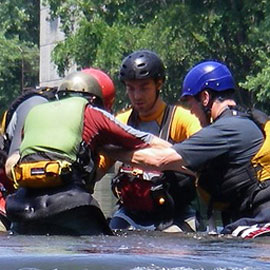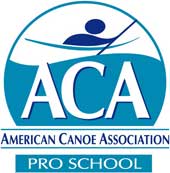ACA L4 Swiftwater Rescue Course
Overview
The Swiftwater Rescue workshop teaches recognition and avoidance of common river hazards, execution of self-rescue techniques, and rescue techniques for paddlers in distress. Emphasis is placed both on personal safety and on simple, commonly used skills. Fundamental and more advanced techniques for dealing with hazards that carry greater risks for both victim and rescuer, such as strainers, rescue vest applications, entrapments, and pins, also are practiced. Scenarios will provide an opportunity for participants to practice their skills both individually and within a team/group context.
Topics Covered:
- Hydrology
- Rescue Organization
- Communication
- Entrapment/Extrication
- Stranded swimmers
- Self-Rescue Techniques
- Mechanical Advantage
ACA L4 Swiftwater Rescue Course
Safety
Because of the risk inherent in any whitewater or river activity, we want to make sure you are aware of these risks and acknowledge them prior to the class. Simply put, we cannot guarantee your safety. If a river rescue or safety class is to be effective and give students whitewater experience and hands-on training, it is not going to be safe. In order for our instructors to provide realistic training with challenges that simulate actual rescue conditions, we recognize there is always the chance that someone is going to get injured. We may be walking along slippery rocky shorelines, swimming in cold whitewater, and working with ropes and rescue equipment in very realistic scenarios. All of this involves risk, and we will try our best to manage risk in a way that creates a balance between the risk students are exposed to and the levels of challenge presented during the training.
This is a skills class where you will be expected to demonstrate the ability to perform some specific skills we cover in the course, such as defensive and aggressive swimming, throw bagging, live bait, z-drags, etc. You may be asked to perform these skills in test stations or drills, or you may be asked to perform them in scenarios.
We encourage you to chat or message us if you have any questions concerning safety. We are proud of our safety record and know that our instructors do not achieve this alone, it takes the help of our students.
2025 Dates :
- June 14–15
Location : Potomac River, specific location dependent on river level. Most likely the Feeder Canal/Little Falls.
Minimum Required Gear :
- Rescue PFD, whitewater helmet, protective clothing suitable for extended swimming in cold water, protective footwear, boat, paddle, whistle, throw rope, 15+ feet of one inch tubular nylon webbing, and 2 locking carabiners, river knife (with blunt tip)

